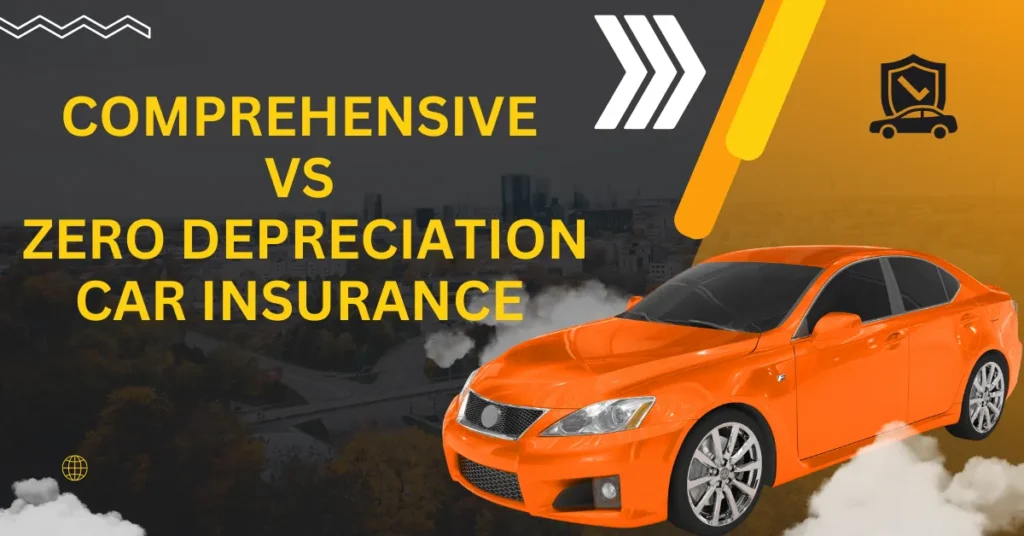When it comes to insuring your vehicle, choosing the right car insurance policy is crucial. Two popular options in the market are Comprehensive vs Zero Depreciation Car Insurance Policy.
While both provide extensive coverage, they differ in terms of benefits and coverage specifics.
This guide will help you understand the differences between these two policies, their advantages, and how to decide which one is best for your needs.

Comprehensive Car Insurance
Comprehensive Car Insurance is a policy that covers a wide range of potential damages to your car, including:
- Third-Party Liability:
- Covers legal liability for damages caused to third parties, including property damage, bodily injury, or death.
- Own Damage Cover:
- Provides coverage for damages to your own car due to accidents, fire, theft, vandalism, natural disasters, and man-made calamities.
- Personal Accident Cover:
- Offers compensation for injury or death of the owner-driver due to an accident.
- Add-On Covers:
- Offers various optional add-ons such as engine protection, roadside assistance, and zero depreciation, which can be included for additional premium costs.
Benefits of Comprehensive Car Insurance
- Broad Coverage: Protects against a wide array of risks and damages.
- Customization: Allows the addition of various optional covers tailored to individual needs.
- Peace of Mind: Ensures financial security against unexpected events and damages.
Drawbacks of Comprehensive Car Insurance
- Costly Add-Ons: While add-ons provide additional benefits, they also increase the overall premium cost.
- Depreciation Factor: The policy considers depreciation on car parts, which means claims are settled after deducting the depreciation amount.
Zero Depreciation Car Insurance
Zero Depreciation Car Insurance, also known as Bumper-to-Bumper Insurance, is an add-on cover to a comprehensive policy. It provides the following benefits:
- No Depreciation Deduction:
- Ensures that the full cost of replacing or repairing car parts is covered without any depreciation deduction.
- Comprehensive Coverage:
- Includes all the benefits of a comprehensive policy but with enhanced claim settlement.
Benefits of Zero Depreciation Car Insurance
- Higher Claim Amount: Claims are settled without considering depreciation, leading to higher payouts.
- Better Coverage for New Cars: Ideal for new and luxury cars where parts replacement costs are high.
- Peace of Mind: Ensures complete financial protection in the event of a claim.
Drawbacks of Zero Depreciation Car Insurance
- Higher Premiums: The premium for zero depreciation cover is higher than that of a standard comprehensive policy.
- Limited Claims: Typically, insurers allow a limited number of zero depreciation claims per policy term.
- Eligibility Restrictions: Often available only for cars up to a certain age, usually not older than 5 years.
Key Differences Between Comprehensive and Zero Depreciation Policies
- Coverage of Depreciation:
- Comprehensive: Claims are settled after deducting depreciation.
- Zero Depreciation: No deduction for depreciation on car parts during claim settlement.
- Premium Costs:
- Comprehensive: Lower premium compared to zero depreciation policy.
- Zero Depreciation: Higher premium due to enhanced coverage.
- Claim Settlement:
- Comprehensive: Payouts are lower due to depreciation deductions.
- Zero Depreciation: Payouts are higher as the full cost of parts is covered.
- Eligibility:
- Comprehensive: Available for cars of all ages.
- Zero Depreciation: Typically available for new cars and cars up to 5 years old.
- Number of Claims:
- Comprehensive: No restriction on the number of claims.
- Zero Depreciation: May have a cap on the number of zero depreciation claims allowed.
How to Choose Between Comprehensive vs Zero Depreciation Car Insurance Policy
Consider Your Car’s Age and Condition
- New/Luxury Cars: Zero depreciation policy is beneficial for new or luxury cars where parts replacement can be expensive.
- Older Cars: Comprehensive policy might be more cost-effective for older vehicles where the depreciation factor is already high.
Evaluate Your Budget
- Budget Constraints: If you are looking to keep premiums low, a standard comprehensive policy may be more suitable.
- Willingness to Pay Extra for Coverage: If you can afford higher premiums for better protection, zero depreciation cover is advisable.
Assess Your Driving Environment
- High-Risk Areas: If you frequently drive in high-risk areas with higher chances of accidents or damage, zero depreciation cover provides better financial security.
- Low-Risk Areas: Comprehensive policy might be sufficient if you drive in safer areas with lower risk.
Personal Preference
- Complete Coverage: If you prefer having maximum coverage and peace of mind without worrying about depreciation, opt for zero depreciation.
- Cost-Sensitive: If you prefer saving on premiums and are okay with depreciation deductions during claims, a comprehensive policy is the way to go.
Recommended Reading
- Finance & Insurance HUB
- The Best Health Insurance in the USA: A Complete Guide
- Comprehensive Insurance for 4-Wheelers: A Complete Guide
- How to Purchase Insurance: A Comprehensive Guide
- How to Purchase Health Insurance and Where to Buy It
- Understanding the Health Insurance Marketplace: A Comprehensive Guide
- Health Insurance Plans for Families: A Comprehensive Guide
- The Best Health Insurance Companies in the USA
- Maximum Loan Amount for a New Four-Wheeler
- Securing a Business Loan in the USA Without Collateral
Conclusion
Choosing between a Comprehensive Car Insurance and a Zero Depreciation Car Insurance policy depends on your individual needs, the age and condition of your car, your budget, and your driving environment.
Understanding the key differences and benefits of each policy can help you make an informed decision that provides the best protection for your vehicle.
By evaluating your specific circumstances and preferences, you can secure the optimal insurance coverage that offers peace of mind and financial security.
Call to Action
Ready to choose the best insurance policy for your car? Assess your needs, evaluate your budget, and explore the options available from various insurers.
Whether you opt for comprehensive coverage or zero depreciation, ensure your vehicle is protected and drive with confidence!